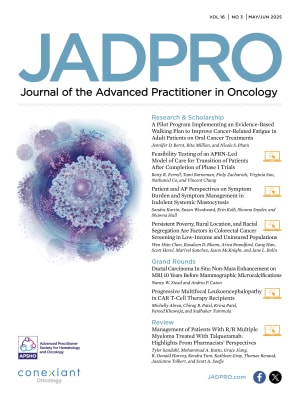Abstract
Head and neck cancer patients often undergo a demanding treatment schedule requiring radiation and chemotherapy. Adherence to these treatment schedules is affected by several issues, including socioeconomic factors, characteristics of the disease and treatment plan, symptoms, and side effects. Oncology advanced practitioners (APs) work directly with patients with head and neck cancer (HNC) during active treatment, often screening for and managing side effects and providing referrals. Evidence-based interventions and innovative strategies for the oncology AP to improve HNC patients’ quality of life and treatment adherence include frequent distress screening, AP-led educational interventions and symptom management clinics, and incorporating technology to allow for close contact with patients during treatment.







